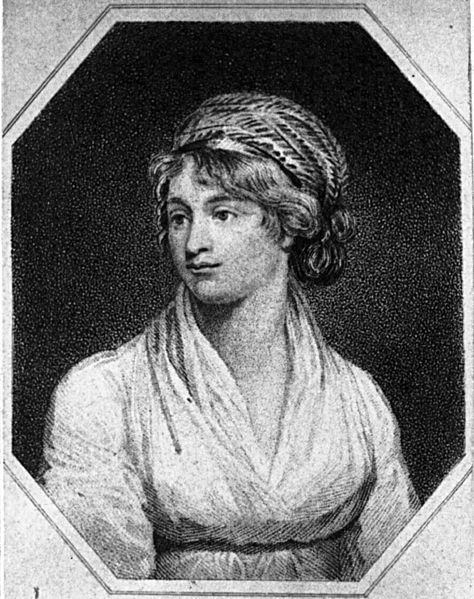Mary Wollstonecraft
By Alessandra Alaman, South Chingford Foundation School
 If I were to ask you to name the top 3 feminist icons in history, who would you say? Some of you would say Eleanor Roosevelt, Emmeline Pankhurst, or Rosa Parks. But if I asked, ‘who was the woman who started it all?’, many would remain silent. Mary Wollstonecraft. The mother of modern feminism. A name that is often forgotten in history.
If I were to ask you to name the top 3 feminist icons in history, who would you say? Some of you would say Eleanor Roosevelt, Emmeline Pankhurst, or Rosa Parks. But if I asked, ‘who was the woman who started it all?’, many would remain silent. Mary Wollstonecraft. The mother of modern feminism. A name that is often forgotten in history.
In the year 1759, this fiercely independent woman from East London was born, shattering barriers in the feminist movement, forever. As a governess, she not only found her passion for educating others but also for creating positive change. With the fire of her personal experiences and a belief that women deserve more, Mary became a passionate advocate of women's rights, and through her ground-breaking book "A Vindication of the Rights of Woman," Mary became a pioneer in the feminist movement, leaving an everlasting impact on women’s fight for equality and inspiring others to demand positive change. With this book, we can finally break away from the idea that women are two-dimensional characters.
Female objects of pity are ubiquitous in literature, and even in Shakespeare's works, women are often relegated to the status of "damsel in distress," existing merely as props. Ophelia serves as a perfect example of this trope. While she may serve as a catalyst for the development of Hamlet's character, she never receives her due as an independent woman. And what happens to her in the end? She drowns.
Yet Shakespeare isn't the only playwright guilty of this sexist representation of women. When female characters do venture against societal norms, they are often punished for straying from the prescribed role of women, like Lady Macbeth or Desdemona. One’s a serial killer and the other gets smothered with a pillow. Clearly, women seem to only be worthy of being main characters when they commit murder or commit sins, and Mary believed it was time to break this cycle of unfair representation and instead give women the complex, nuanced roles they deserve.
She continues her passionate advocacy by critiquing the works of history and classic literature’s biggest writers. She critiques men just like the flawed moralist, Rousseau, whose work coined the phrase “The Jean-Jacques Problem.” Mary’s work not only exposes Rousseau’s patriarchal and “functionalist” attitude toward women but denounces it as the fatal flaw in all his entire political theory. Rousseau's attempt to "put women firmly back in the home" is “ironic" and even "illogical" given Rousseau's otherwise egalitarian principles of equality, freedom, and sovereignty. Rousseau denied women “all capacity and all political right”, and carried on writing about women as if they have the emotional depth as a peanut butter Reese’s Cup, yet he is still treated as the 18th century Gandhi.
Yet have times really changed, centuries later? Elena Maria Vidal argues that women cannot seem to win in the historical literary world. They are either only portrayed as strong and to be respected when seen to be as physically able as men, or they all need to become the next Cleopatra or John Lennon. Biographies scour letters and diaries for the slightest indication that they are “rebellious”. An example of this is none other than Mary Wollstonecraft’s friend, and my most loved historical figure, Marie Antoinette. Her biographies harbour the notion of great and spiritual love affairs that the Queen allegedly had, yet it is a mere fabrication that should qualify as a novel or fantasy rather than as historical fiction, and serious Historians such as Desmond Seward seem to agree. Yet, there is no great conspiracy here. Publishers know that stories of adulterous love affairs sell far more than stories of chaste and faithful marriages.
I mean, would any of you truly read about a boring nuclear family? Thus, the public gets what they want. Women who are only either foils for men or immoral main characters. And the irony is that Mary Wollstonecraft embodying the same “adulterous” characters that many people strongly love is what caused her to lose popularity. She had affairs, and history has looked down on her forever for it. Mary Wollstonecraft's personal life, though marked by some unconventional choices, should not overshadow her immense contributions to literature and philosophy. While her relationships may have attracted attention, it is her ground-breaking ideas and writings on women's rights and education that should truly define her legacy and define her legacy she did by giving birth to a literary genius - Mary Shelly, the writer of Frankenstein. Perhaps, this is the call we need to finally start caring about women's legacies…instead of their legs. As a society, we should work together to follow Wollstonecraft ideas, and finally turn our women from objects of pity… into women who are strong and powerful no matter if they wish to be fit and independent or traditional and family-oriented.
Image: Mary Wollstonecraft (1759-1797), engraving by James Heath after a painting by John Opie. Public domain

